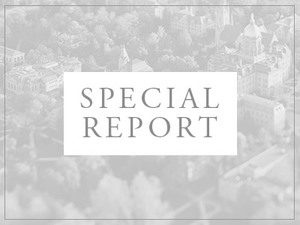 "
"
Peace is not the product of one single person; by definition, it must be forged from a collective effort.
Colombian President Juan Manuel Santos — the 2016 recipient of the Nobel Peace Prize — recognizes this fact. On Dec. 10, during his Nobel acceptance speech in Oslo, Norway, Santos thanked those who helped end civil war in his home country of Colombia, and specifically acknowledged the University of Notre Dame.
He noted the Kroc Institute for International Peace Studies’ efforts as an academic partner in the peace process and as part of the implementation of the peace agreement through the Peace Accords Matrix project.
“The Kroc Institute for International Peace Studies at the University of Notre Dame in the United States has concluded, based on careful studies of the 34 agreements signed in the world to end armed conflicts in the past three decades, that this peace agreement in Colombia is the most complete and comprehensive ever reached,” the president said in his speech.
The peace between the country’s government and the FARC rebels ended a 52-year civil war in the country, the western hemisphere’s longest and largest armed conflict.
The Kroc Institute has provided analysis and research to the Colombian peace process for many years. The Institute’s Peace Accords Matrix (PAM) uses quantitative and qualitative data in order to comprehensively track the implementation of intrastate peace agreements.
According to President Santos, peace may not have been possible without the efforts of members of the Kroc Institute.
John Paul Lederach, former director of the PAM project, said in a Notre Dame News article, “It is an extraordinary speech — in particular his emphasis on moving from enemy to adversary, humanizing the conflict, and the call to end war globally.”
In August, the Kroc Institute announced that PAM would be directly involved in the ongoing “technical verification and monitoring of historic Colombian peace accord.”
The peace that Santos, the Kroc Institute and many others worked for almost fell through when an Oct. 3 referendum to approve a peace deal was struck down by a razor-thin 50.2 to 49.8 percent margin.
After the referendum and in preparation for his acceptance of the Nobel Prize, Santos and his allies worked to incorporate the concerns of the Colombian people in a new agreement. The Colombian Senate ratified the new “final” peace accords on Nov. 29.
Lederach called the president’s speech “a bright spot in the many tough days ahead.” Lederach said, “As we know, an agreement is only as good as its implementation.”
The Kroc Institute has studied a number of peace settlements through the PAM project and reports that half of all negotiated agreements fail. The Colombian peace deal, “the most complete and comprehensive ever,” successfully addresses root causes of conflict, according to Kroc.
The challenge to reach peace does not end with signed agreements and acceptance speeches.
President Santos must now guide his country to maintaining peace and the Kroc Institute will play a role in making sure the peace accords are implemented, which will be tough, but not impossible.
“As such, the Colombian peace agreement is a ray of hope in a world troubled by so many conflicts and so much intolerance,” Santos said.